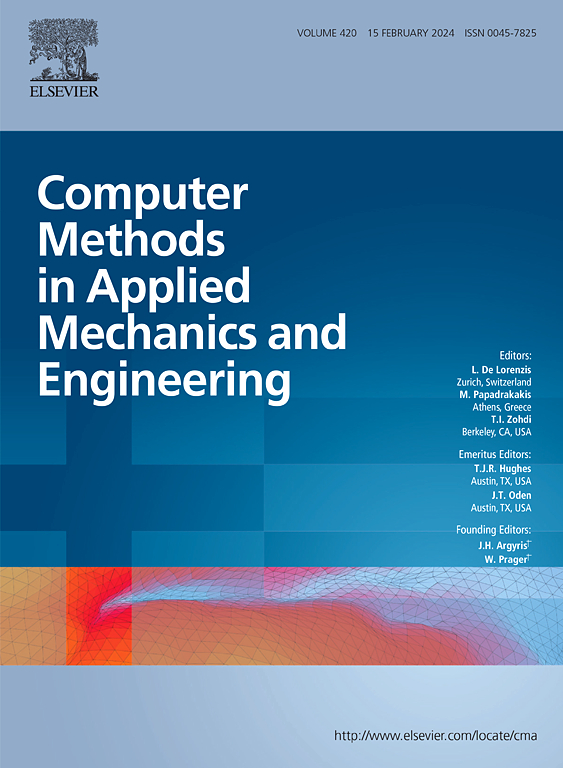A novel framework for fatigue cracking and life prediction: Perfect combination of peridynamic method and deep neural network
IF 6.9
1区 工程技术
Q1 ENGINEERING, MULTIDISCIPLINARY
Computer Methods in Applied Mechanics and Engineering
Pub Date : 2024-11-04
DOI:10.1016/j.cma.2024.117515
引用次数: 0
Abstract
This paper presents an innovative methodology that seamlessly integrates the peridynamic method with advanced deep learning techniques, specifically utilizing the Gated Recurrent Unit (GRU) neural network. This integration results in the development of a highly accurate and efficient model for predicting fatigue cracking and life. This model can effectively forecast the fatigue crack patterns and fatigue life, effectively addressing the limitations of existing data-driven models, which often struggle with accurately predicting fatigue crack growth. One of the key advancements of this study is the significant enhancement in numerical efficiency, reducing the computational cost to mere hundreds of seconds, a substantial improvement over traditional peridynamic simulations. The study begins by establishing a peridynamic fatigue damage model, which is used to generate a comprehensive dataset of mechanical behavior under fatigue loading. A strategy is developed to convert the mechanical data into a suitable format for deep learning, which enables the creation of well-structured training and testing datasets. The Peridynamic-Gated Recurrent Unit (PD-GRU) data-driven model is then proposed, demonstrating exceptional numerical performance and operational efficiency. Through a series of rigorous numerical analyses, the PD-GRU model's capabilities are validated, highlighting its potential as an innovative perspective and groundbreaking tool in the fatigue analysis of materials and structures.
疲劳开裂和寿命预测的新框架周动力学方法与深度神经网络的完美结合
本文介绍了一种创新方法,它将周动态方法与先进的深度学习技术无缝集成,特别是利用了门控递归单元(GRU)神经网络。通过这种整合,开发出了一种高精度、高效率的疲劳开裂和寿命预测模型。该模型能有效预测疲劳裂纹模式和疲劳寿命,有效解决了现有数据驱动模型在准确预测疲劳裂纹增长方面的局限性。这项研究的主要进展之一是显著提高了数值效率,将计算成本降低到仅需数百秒,比传统的周动态模拟有了很大改进。该研究首先建立了一个周动态疲劳损伤模型,用于生成疲劳加载下机械行为的综合数据集。研究还开发了一种策略,将机械数据转换成适合深度学习的格式,从而创建结构良好的训练和测试数据集。然后提出了 "周动力门控递归单元"(PD-GRU)数据驱动模型,该模型展示了卓越的数值性能和运行效率。通过一系列严格的数值分析,PD-GRU 模型的能力得到了验证,凸显了其作为材料和结构疲劳分析的创新视角和开创性工具的潜力。
本文章由计算机程序翻译,如有差异,请以英文原文为准。
求助全文
约1分钟内获得全文
求助全文
来源期刊
CiteScore
12.70
自引率
15.30%
发文量
719
审稿时长
44 days
期刊介绍:
Computer Methods in Applied Mechanics and Engineering stands as a cornerstone in the realm of computational science and engineering. With a history spanning over five decades, the journal has been a key platform for disseminating papers on advanced mathematical modeling and numerical solutions. Interdisciplinary in nature, these contributions encompass mechanics, mathematics, computer science, and various scientific disciplines. The journal welcomes a broad range of computational methods addressing the simulation, analysis, and design of complex physical problems, making it a vital resource for researchers in the field.

 求助内容:
求助内容: 应助结果提醒方式:
应助结果提醒方式:


